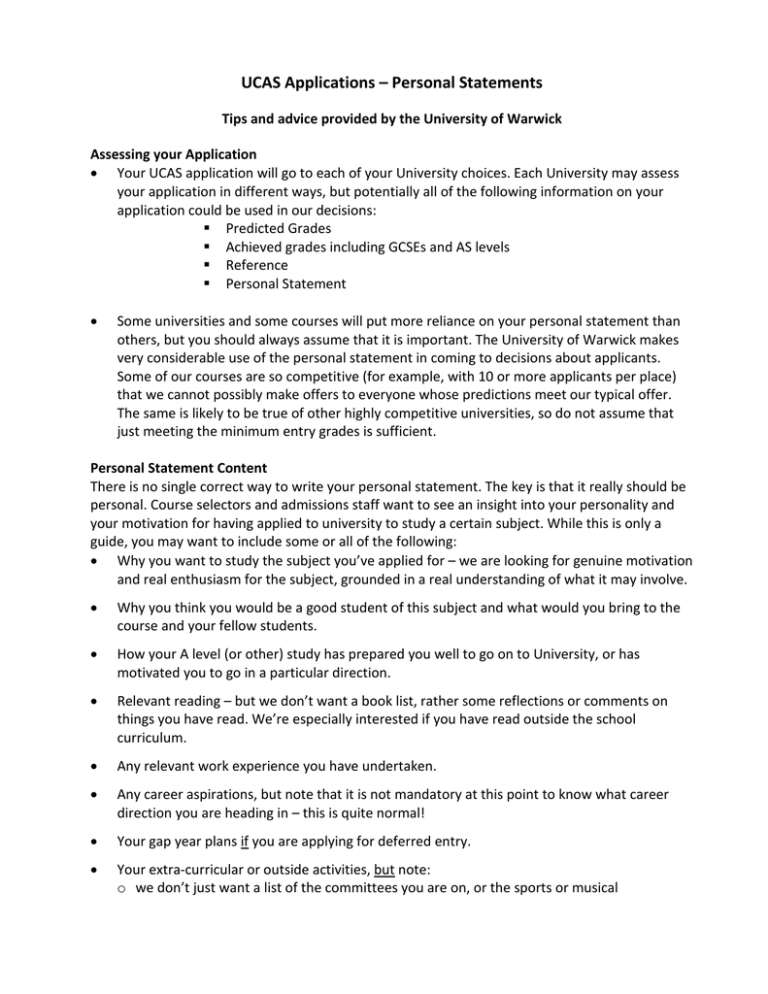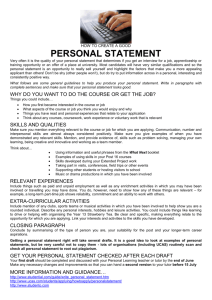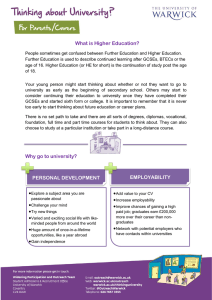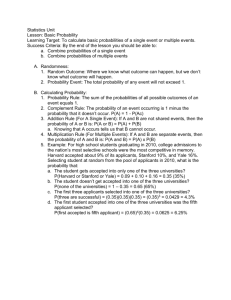UCAS Applications – Personal Statements
advertisement

UCAS Applications – Personal Statements Tips and advice provided by the University of Warwick Assessing your Application Your UCAS application will go to each of your University choices. Each University may assess your application in different ways, but potentially all of the following information on your application could be used in our decisions: Predicted Grades Achieved grades including GCSEs and AS levels Reference Personal Statement Some universities and some courses will put more reliance on your personal statement than others, but you should always assume that it is important. The University of Warwick makes very considerable use of the personal statement in coming to decisions about applicants. Some of our courses are so competitive (for example, with 10 or more applicants per place) that we cannot possibly make offers to everyone whose predictions meet our typical offer. The same is likely to be true of other highly competitive universities, so do not assume that just meeting the minimum entry grades is sufficient. Personal Statement Content There is no single correct way to write your personal statement. The key is that it really should be personal. Course selectors and admissions staff want to see an insight into your personality and your motivation for having applied to university to study a certain subject. While this is only a guide, you may want to include some or all of the following: Why you want to study the subject you’ve applied for – we are looking for genuine motivation and real enthusiasm for the subject, grounded in a real understanding of what it may involve. Why you think you would be a good student of this subject and what would you bring to the course and your fellow students. How your A level (or other) study has prepared you well to go on to University, or has motivated you to go in a particular direction. Relevant reading – but we don’t want a book list, rather some reflections or comments on things you have read. We’re especially interested if you have read outside the school curriculum. Any relevant work experience you have undertaken. Any career aspirations, but note that it is not mandatory at this point to know what career direction you are heading in – this is quite normal! Your gap year plans if you are applying for deferred entry. Your extra-curricular or outside activities, but note: o we don’t just want a list of the committees you are on, or the sports or musical instruments you play. We are interested in how your activities have helped you develop skills or qualities that will make you a good student and member of our university. o it is unadvisable to focus on extra-curricular activities at the expense of the course you wish to study; you may want to think in terms of a 75:25 split between discussing your course and discussing wider activities, although there is no one “correct” formula. Style and general tips Again, there is no right or wrong way to write a personal statement, but the reader will want to see a glimpse of the “real you”. Therefore you might want to bear the following in mind: Make sure you sound interesting – and interested. Course selectors and admissions staff will soon pick it up if your enthusiasm for the subject is not genuine or only skin-deep. Don’t rely on flowery language to communicate your enthusiasm to us: we want solid examples (e.g. of reading, learning, discussions, visits, work, ideas …) which will demonstrate your eagerness to study this course. Use full sentences and paragraphs rather than bullet points. This should be a “mini-essay”, and the reader will be looking for evidence of whether you can construct an argument in a piece of continuous writing. Make sure your argument flows, and that you have arranged your points in a logical order. Avoid repetition! Don’t list your exam subjects and grades, as we can see these elsewhere on the application, and don’t repeat points you have made earlier in the statement. Avoid lists: whether of books read, musical instruments played, subjects studied … they don’t tell us very much. We want to know what you have taken from these and how they might be relevant to your application. Don’t make mistakes in spelling, grammar or sentence construction. These will not impress universities and in situations where the course selector has applicants of equal quality and experience it will matter. Proof-read carefully and don’t just rely on your computer’s spellchecker. It’s useful to ask another pair of eyes to check your statement over – though it should be ‘your’ statement, not theirs. Don’t make things up. You will not come across as sincere if you claim to read books that you have not read, or to have visited places you know nothing about. If you are applying for a course where you may be interviewed, you can expect your interviewer to ask you about anything you mention in your personal statement. Don’t try and be funny. Humour is a risk, which can often backfire. Remember: you don’t know anything about the people who will be reading your personal statement, other than that they will be passionate about the subject you have applied for. They might misconstrue your humorous anecdote to be making fun of the subject. Above all: Remember to focus on the course you have applied for and your reasons for wanting to study it. In a large pool of well-qualified applicants, this may be your one chance to stand out from the crowd. Convince us that YOU deserve a place on this course. FAQs I am applying for different subjects at different universities. How can I write one personal statement that reflects this? Can I submit more than one? Not usually. The UCAS system allows for only one personal statement which will go to all your choices, and many Universities won’t be prepared to consider a further statement from you because they have large volumes of strong applicants to consider, and may feel it would not be fair to give one candidate the chance to write a second statement. If the courses you are applying to are quite similar (e.g. “History” at one university and “History and Politics” elsewhere), then it may be quite possible to write a good personal statement that would suit both courses. For example, a discussion of politics and how it links to history could be considered very relevant and interesting in a personal statement for single honours History. If you are applying for two very different subjects, you will have a difficult job to write your personal statement. You might want to start to reflect on why you are considering two such different courses and whether they are both what you really want: remember that at the end of the day, you will only end up on one of them. If you are applying for Medicine and wish to use your fifth choice for a related subject (e.g. Biochemistry or Medical Science), then your fifth university will often not mind if your personal statement is geared largely, or entirely, towards the study of Medicine. However, it might be worth checking this out with them in advance. My study has been disrupted by illness / family difficulties / problems with the teaching at my school. Should I mention this in the personal statement? We would like to know about circumstances beyond your control that have disrupted your studies. However, we would advise you to use the limited word-count of the personal statement to focus on the course applied for. It may be better to ask your referee to mention the challenging circumstances in your reference; or alternatively you could write your universities a letter explaining what you need to convey. Warwick operates a system called AWARDS which allows you to submit a supplementary form telling us about any challenging circumstance you have faced. See go.warwick.ac.uk/awards Do I have to use the full space available? Is a longer personal statement going to be more impressive? This is up to you. Most people find that they need most of the available space to say all that they need to, but if you can make your important points more succinctly, then go ahead! Bear in mind, however, that if your statement is very short you may come across as lacking in motivation. Do my extra-curricular activities really have a bearing on whether I’m going to get a University place? Possibly. This will vary between courses and universities, so don’t make assumptions as your five choices may look at this information differently. For some courses, extracurricular activities may be directly relevant to your subject (e.g. Music, Theatre). Some other courses, such as Medicine, may look closely at your extra-curricular activities for evidence of personality traits that will help you succeed in a very demanding profession, such as stamina, leadership and commitment. That said, the most important thing to focus your personal statement on is the course you have applied for. If you take up too much of your statement talking about your wider activities, the University won’t be able to tell that you are really motivated to study your course. When mentioning extra-curricular activities, try to focus on the particular skills or qualities that your activities have given you rather than simply listing interests or achievements. I haven’t done any work experience / my work experience was not relevant to the course I’m applying for. Does this matter? Some vocational courses (e.g. Social Work, Veterinary Science) have very specific work experience requirements, so check out their websites carefully before applying. In general terms, if you haven’t done any work experience then there will be plenty of other things to mention in your personal statement – there is no “one size fits all”, and a discussion of work experience isn’t an essential requirement of every personal statement. If you feel your work experience isn’t relevant, think carefully about how you discuss it. You may wish to leave it out altogether to allow you to focus on discussions that are more relevant to the course applied for; or you may feel that your work experience helped you to develop skills or ideas that are in fact relevant to your course or future career – in which case, you could focus on these rather than the details of the actual workplace.




